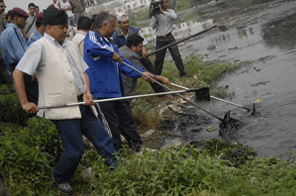Ex-minister stresses proper management of household waste
- 8,000 tonnes of waste is collected in the Valley annually
Kathmandu, January 17
Former minister for science, technology, and environment Ganesh Shah today said proper management of household waste would go a long way in helping reduce pollution in the city.
At a programme ‘Korean Technology for Waste Management’, Shah said, “If every household separates organic and inorganic waste, and converts organic waste to compost for personal use, the city’s environment would be greatly helped.”
Shah said waste management technologies must be encouraged and the government must introduce projects to expand the use of such technologies.
According to KMC, it collects approximately 250 tonnes of the 300 tons of waste generated in Kathmandu every day, a collection efficiency of around 83 per cent.
A field survey of Solid Waste Management in Kathmandu Metropolitan City conducted in 2003 showed that the average per capita household waste generation rate in Kathmandu was 0.39 kg per person per day. This is more than the average waste generation rate in other urban areas of Nepal, which is 0.25 kg per person per day.
This figure is also higher than the waste generation rate calculated by Kathmandu Metropolitan City. According to studies conducted by KMC in 2000, waste generation rate in Kathmandu was 0.225 kg per person per day.
“Machines to convert organic waste to energy will be available for every individual household soon,” said Laxmi Shrestha, managing director at Action Waste Private Limited. The company has been planning to set a plant to manufacture the machines inside the country.
Rajaram Karmacharya, an official at the Department of Solid Waste Management at KMC, said over 8,000 tonnes of waste a year was collected in the Valley. “If the waste could be converted into energy or compost, it would be very helpful,” he said.






